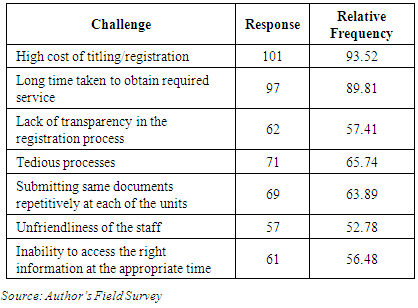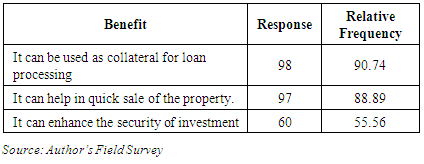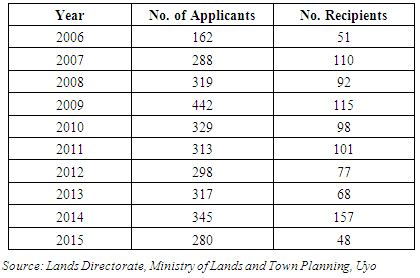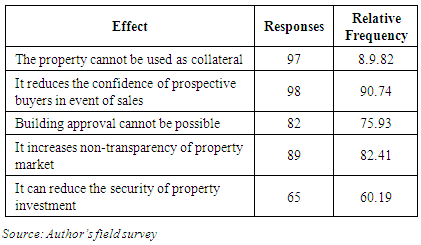-
Paper Information
- Next Paper
- Previous Paper
- Paper Submission
-
Journal Information
- About This Journal
- Editorial Board
- Current Issue
- Archive
- Author Guidelines
- Contact Us
American Journal of Economics
p-ISSN: 2166-4951 e-ISSN: 2166-496X
2019; 9(4): 207-212
doi:10.5923/j.economics.20190904.06

An Investigation of Effect of Land Titling Processes on Property Development in Uyo, Nigeria
Okey Francis Nwanekezie1, Ethel Asinya Mendie2
1Department of Estate Management, University of Uyo, Akwa Ibom State, Nigeria
2Department of Estate Management, Cross River State University of Technology, Calabar, Cross River State, Nigeria
Correspondence to: Okey Francis Nwanekezie, Department of Estate Management, University of Uyo, Akwa Ibom State, Nigeria.
| Email: |  |
Copyright © 2019 The Author(s). Published by Scientific & Academic Publishing.
This work is licensed under the Creative Commons Attribution International License (CC BY).
http://creativecommons.org/licenses/by/4.0/

Land title is an essential requirement for building approval and thus property development, but its processes are faced with several challenges. This study was designed to survey the applicants of land title in Uyo within a 10 years period to investigate the challenges and effect of these, on property development. One hundred and sixty-four (164) of the applicants were selected through table of random numbers and the data were analyzed using relative frequency and student T-Test. The study found that the registration process for land title in Uyo is characterized by high charges, lengthy or unknown duration to obtain the title, lack of transparency and inability of the applicants to access the right information at the appropriate time. The study also found there is significant difference between numbers of applications received each year for land title, and the actual number that collect the certificate. Delegation of Governor’s consent and reducing of the charges among other issues were recommended for improvement.
Keywords: Land, Land Use and Allocation Committee, Land title, Deeds
Cite this paper: Okey Francis Nwanekezie, Ethel Asinya Mendie, An Investigation of Effect of Land Titling Processes on Property Development in Uyo, Nigeria, American Journal of Economics, Vol. 9 No. 4, 2019, pp. 207-212. doi: 10.5923/j.economics.20190904.06.
Article Outline
1. Introduction
- Land title is considered a key determinant to economic and property development (Omirin 2003, Galiani and Schargrodsky 2010 and Ojo 2014). This is because; it protects an individual’s investment and ensures that others do not appropriate the fruits of his investments. In Nigeria, it is not uncommon to find millions of city dwellers without formal titles to the property they own and occupy. These non-possession of formal property titles usually impede the use of such property as collateral to access the credit markets. It also affects the sales of such property, as investment in untitled land is illiquid. Due to the high level of fraudulent activities in the private land market, most prospective buyers will prefer government allocated plots to individual private plots, since title information on government plots are readily available.Thontteh and Omirin (2015) see land registration as systems by which matters concerning ownership, possession or other rights in land can be recorded to provide evidence of title, facilitate transactions and prevent unlawful disposal. They further stated that it involves a system where ownership of real property is established through the issuance of an official certificate indicating the name of the individual in whom such ownership is vested. Awolaja (2016) sees land registration systems as involving deeds recording and title registration such that it gives publicity to land transactions, thereby helping to prevent concealed dealings. Udoka (2017) view land title as the documentary evidence of the right of ownership on a given plot of land to an individual or group. From the above definitions, it is obvious that land title registration is that system of recording land transactions and rights over plots to give it publicity. It also involves issuing each property owner whose transaction and rights have been properly documented a certificate. It is the authentication of the ownership of, or a legal interest in, a plot of land. Awolaja (2016) opined that the act of registration confirms transactions that confer, affect or terminate that ownership or interest and once the registration process is completed, no search behind the register is needed to establish a claim of title to the property, for the register itself is conclusive proof of title.Land titling is usually administered through various government departments, ministries or agencies with each overseeing specific aspect. In Akwa Ibom State, the Ministry of Lands and Town Planning manages, control and regulates land use. The ministry embodies the Survey Division, Town Planning Directorate, Land Use and Allocation department, Lands Directorate, Urban Renewal, and Housing department. These departments are expected to work together to foster effective land titling. Udo (2017) opined that the process of land titling is often very time-consuming and it can take over a year for title issuance. But according to the World Bank (2014), it take an average of one hundred and ten (110) days for title to land to be registered in Nigerian States where the Governor’s consent is not delegated and sixty-seven (67) days in States where Governor’s consent is delegated. Unfortunately, the situation on the ground in Akwa Ibom State presently, belies the World Bank assertion. Currently there is a back load of applications for certificate of occupancy that has not been processed for the past two (2) years. Besides the tedious procedure, the cost is also prohibitive. An intending property developer who just bought a plot of land and wants to perfect his title will need close to four hundred thousand naira (N400,000.00). He will likely spend N150,000 for the land survey, 3% of the purchase price at Board of internal revenue for stamp duties, N15,000 at deeds registry to document the power of attorney (land agreement), N40,000.00 at land use and Allocation committee for letter of consent and N50,000 at certificate of occupancy unit of Lands Directorate for the processing of certificate of occupancy. This is beside the cost of tax clearance and other un-official payments he will have to make.Babade (2003), Omirin (2003), Ojo (2014) and Awolaja (2016) have assessed land title and registration in south-western Nigeria without corresponding work in other parts of the country. While Udo (2017) in Uyo evaluated land administration in Akwa Ibom State without examining the effect of titling processes on the property development. Therefore, there is need to investigate the effect of land title process on property development in Uyo. As earlier noted, an average developer in Akwa Ibom State is faced with a lot of hurdles in an attempt to develop property. Given the above, the following questions are germane:i. What are the challenges faced by developers in land title registration in Uyo?ii. Is there any significant difference between the numbers of those who applied for certificate of occupancy and those that eventually collected it?iii. What is the effect of non-title on property development?This paper is structured into five sections with section one being the introduction and section two, literature review. Section three contains the research methods adopted to arrive at the findings, while data presentation and discussion is treated in section four and section five concludes the work and offers some suggestions/recommendations.
2. Literature Review
- Several studies have been carried out on land title both in Nigeria and offshore. A few of the related literature are reviewed below.Ajoku and Nubi (2003) examined the effectiveness of land administration in Lagos with particular focus on the practicality and impact of the 30-day Governor’s consent and certificates of occupancy procurement regime, which was introduced to facilitate land documentation and registration for housing delivery in the state. The study found that despite reducing the time required for processing and granting certificates of occupancy, this policy has not resulted in significantly increased applications nor has it had a significant effect on housing delivery. This study was non-empirical in nature hence its findings cannot be verified and generalized.Babade (2003) examined the activities of Lagos State Land Use and Allocation Committee in giving access to urban land in Nigeria. The author used data from the records of Land Use and Allocation Committee; also questionnaires were administered on the Ministry of Land staff, estate surveyors, property developers, Lawyers, applicants of state land allocation and heads of households using random sampling technique. The study showed that the politicians and public servants gained better access to state land to the detriment of other socio-economic groups. It also revealed that the allocation process at the Lagos State Land Use and Allocation Committee office is based on favoritism. The findings furthered showed fraud, lack of vacant land, and high cost of acquisition as reasons for difficulty in acquiring state land in Lagos State. The study did not state the study population or the sample size. Moreover, the data analysis only reflected the percentages without the number of respondents. One may argue that the percentages could be the author’s manipulated figures and thus its findings may be unreliable and cannot be said to be the true reflection of the activities of Land Use and Allocation Committee in Lagos State as presented by the study.In a study of land accessibility in Nigeria, Omirin (2003) highlights the problems of land accessibility in Lagos State. Using non-empirical approach and citing examples from previous empirical studies, the author concluded that “extant policies are not only ineffective but also counterproductive in that they have introduced greater barriers to private access to land than existed under the free land market”. The author also reasoned that the existing land use regulations do not guarantee equitable and sustainable development. The paper recommended the removing of official barriers to land transactions and tax instrument to correct some of the market anomalies. This paper did not address any case study neither was it empirical or experimental. Therefore, the conclusions and recommendations may be regarded as the opinions of the author.Galiani and Schargrodsky (2010) in a study of effects of land titling on the poor in Argentine used data from two surveys performed in 2003 and 2007. The study found that titling poor families substantially increased housing investment, reduced household size, and enhanced the education of their children relative to the control group. The authors submitted that the effect did not take place because of improved access to credit, but the result suggested that land titling was an important tool for poverty reduction, albeit not through the shortcut of credit access, but through the slow channel of increased physical and human capital investment. The findings of the study helped in establishing the positive effects of land titling on the poor and it follows that in Nigeria, if the poor would also have titles to land, it could improve their standard of living. However, the study made use of only one case study which limited its generalization.Ndukaku (2010) in Enugu, Nigeria analyzed the effects of the Land Use Act of 1978 on property development with emphasis on ease of accessibility, ease of acquisition and security of title. It sampled 368 respondents out of a study population of 4,650 of REDAN (Real estate developers association of Nigeria) Staff, registered estate surveyors and valuers and landlords. Data was analyzed using frequencies, and percentages, while the formulated hypothesis was tested using binominal test of proportions and chi-square techniques. The tested hypotheses showed that the Land Use Act do enhance security of title to land in Nigeria. It also revealed inaccessibility and difficulty in land acquisition in Nigeria by common citizens. The study suggested the amendments of some sections of the Land Use Act to accelerate the speed with which land is made available at reduced cost. Though, this study is on title to land but it has not examined its effect on property development.In an empirical study of end-user’s satisfaction on land title registration process in Akure, Ojo (2014) surveyed one hundred and eleven (111) land allied professionals through structured questionnaires. The gathered data was analyzed by means of frequency distribution, percentages and weighted mean score. The study revealed that the respondents were dissatisfied with land title registration process of Ondo State in the areas of accessibility to land services, time taken to obtain required service, level of transparency in land registration and friendliness of staff and management. However, they were satisfied with mode of payment for service provided. This, the author reasoned, is due to electronic mode of payment in the country which enhance convenience. However the choice of the author to sample allied professionals instead of the actual applicants of the land titles, when it is a known fact that majority of the applicants do not go through any professional, when registering their titles; instead preferring going through some of the registry staff and their relatives, makes the findings limited to the professionals and may not be considered as the general situation/condition of the applicants.Thontteh and Omirin (2015) examined land registration within the framework of land administrative reforms in Lagos State. A cross-section of one hundred and fifty three respondents comprising firms of estate surveyors, firms of legal practitioners and staff of Lagos State land registration offices were surveyed using structured questionnaire. Mean score and factor analysis were used to analyze the data. The study found that Electronic Document Management System (EDMS) of Lagos State has not aided land dispute reduction, neither has it increased number of applications processed nor increased revenue generated. It however found that EDMS has improved public confidence in transactions, centralized and consolidated file storage and facilitated availability of on-line document search and retrieval system at the registry. The work further showed that the EDMS has reduced waiting time for obtaining information on land matters and improved managerial efficiency. The findings of the study indicated that with time, the process of land title registration in the state can improve significantly. Unfortunately the study did not investigate the disposition of the applicants who went through the EDMS to ascertain their convenience with the system.Awolaja (2016) in an exploratory study of land registration in Lagos State land registry, highlights the benefits of efficient land registration system to include; giving the land owner or proprietor a state guaranteed title, which can be used to access bank loans for small business development. It will also increase the revenue generated for the state budget and enhance conveyance, since prospective buyers can carry out an official search before completing a purchase. The challenges of land title registration in Lagos State as explained by the author include non-capturing of all parcels of land in the state through efficient and proper cadastral surveys; non-recognition of land administration experts such as estate surveyors and valuers as registrars of titles; haphazard storage of land documents at the registry; non-cooperation of land owners especially “omo oniles” in ensuring proper land titling registration; and inadequate funding of the land registry. The author advocated for a sustained level of improvement in the registration procedure especially with the introduction of Electronic Data Management System (EDMS). This study lacks the empirical depth as it was mainly exploratory in nature, thus its findings may be unverifiable.Udo (2017) in Uyo evaluated the impact of land administration on housing delivery. A cross-section of 312 respondents consisting of applicants for land title/documentation between 2006 and 2015 and staff of Government agencies/parastatals were surveyed. Correlation analysis and relative importance index were used to analyze the gathered data. The study found that tedious and repetitive processes, high cost of titling, multiple taxation, and high cost of securing development approval, characterized land administration in the state. The study also found that communication and collaboration between agencies handling land administration in the state is poor and that this poor institutional arrangement results in lack of adequate information about land, constricts the land market and interferes with the delivery of land for housing. The author recommended subsidized cost of registration, improvement of the registration system through computer aided programs etc.Udoka (2017) studied the effect of registration of land titles on property investment. The research adopted a descriptive design, with data obtained from secondary sources. The study found that registration of title on land over which property investment takes place reduces information asymmetries, as both parties to land transaction can gain access to the same information, with the buyer receiving state guarantees about the authenticity of the registered information on land. It also found that land registration offers the land owners access to cheaper and additional medium or long term credit through mortgage; speedy and smooth land transaction and security of property investment. This study did not employ any survey nor study any land administration system to arrive at its findings and conclusion. Therefore, the findings should be considered as the author’s opinion. Moreover, the study was not conducted in any specific location.
3. Land Titling in Akwa Ibom State
- A lot of processes and procedures are required in Akwa Ibom State for title to land to be registered. Upon purchase of land, the instrument of the purchase (Power of Attorney) usually prepared by a legal practitioner is executed in court and thereafter stamp duties of 3% of the land cost is paid at Board of internal revenue service. Cadastral survey of the plot and processing of certificate of Deposit (C of D) in the office of the Surveyor-General of the State is done. Thereafter, the instrument (Power of Attorney) is registered at the Deeds Registry of the State ministry of Lands and Town Planning. Upon successful registration of Deed instrument the applicant moves to Land Use and Allocation Committee (LUAC) office, obtain, fill and submit application for consent. The following documents are usually required at the submission of the consent form: 2 original copies/1 photocopy of survey plan; 2 original copies/1 photocopy of certificate of Deposit; tax clearance certificate for the last 3 years; 2 original copies of duly registered Power of Attorney; I photocopy of registered Power of Attorney; 2 passport photographs; estimated cost of development; 2 self-addressed envelopes with stamps; and 2 file jackets.The interest subsisting in the plot will be examined by the Land Use and Allocation Committee (LUAC) to ensure government’s interest is protected and no conflicts exist between individual interest and existing land-use patterns. Once, the examination result is positive, Approval-in-principle and a letter of consent to develop will be issued to the applicant. Thereafter, the applicant will move to the Certificate of Occupancy Unit of Ministry of Lands for the processing of the certificate of occupancy with documents similar to the ones submitted at the LUAC. Upon approval and signing of the certificate by the Governor, the applicant will again pay stamp duties at a nominal rate for the certificate of occupancy before it is registered fully at the Deeds Registry of the Ministry of Land. After the registration at the Deeds Registry, the applicant will now be issued with the certificate.
4. Research Methods
- The applicants for land title (Certificate of Occupancy) in Uyo between 2006 and 2015 constituted the study population. The available records from Lands Directorate of Ministry of Lands and Town Planning, Uyo, show that there are 3,093 applicants of certificate of occupancy in Uyo local government area between the study period of 2006 and 2015. The sample size was determined at 95% confidence level to be 163.84 which was approximated to 164. Thus structured questionnaire was administered on the 164 applicants using a table of random numbers. The researcher was able to retrieve 108 questionnaires representing 65.85% of the respondents. Secondary data on number of applications received, and numbers that collected the certificate, were sourced from the records of lands directorate to test the difference between the number of applications and the number that successfully collected their land title. Simple percentage was used to analyze the data from the questionnaire, while student - T test was used to test the significant difference between number of applications and number of collection.
5. Discussion of Findings
- This section presents the data collected from the field survey and the analysis. The first question posed to the respondents was on the challenges they experienced in processing their land title documents and their responses are tabulated in table 1 below:
|
|
|
|
6. Conclusions and Recommendations
- This study concludes that the registration process for certificate of occupancy (land title) in Uyo is characterized by high charges, lengthy or unknown duration to obtain the title, lack of transparency, unnecessary repetitive submitting of same documents and inability of the applicants to access right information, at the right time, which would have reduced some of the wasted time. The research also concluded that there is significant difference between the applications received in each year and the actual number of applicants issued with the certificate.It is the belief of the researcher, that, if the some of the charges are reduced, the Governor delegates his power of consent, public enlightenment of the requirements and procedure, transparency on the process and introduction of electronic database; all these will enhance and improve the registration or titling process in the state.
 Abstract
Abstract Reference
Reference Full-Text PDF
Full-Text PDF Full-text HTML
Full-text HTML


